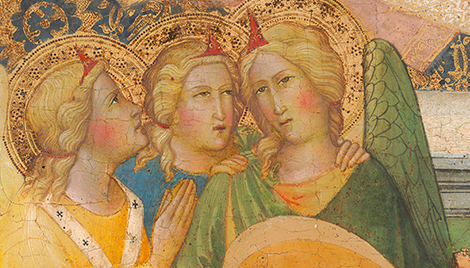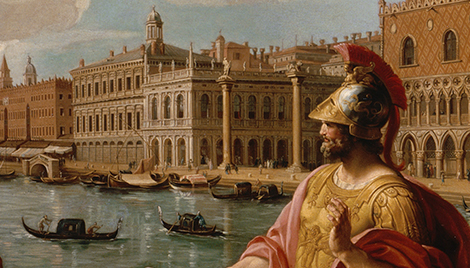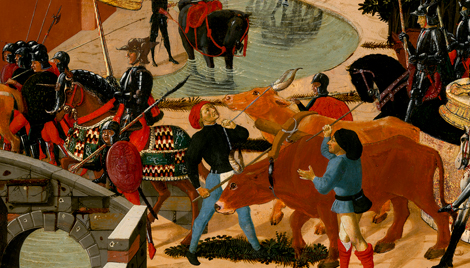CUNY Summer 2019 Latin / Greek Institute
In 2019 the Kress Foundation made an award of $12,000 to The Graduate Center, CUNY in continued support of its Latin / Greek Institute. The grant funds provided scholarships for graduate art history students to attend the summer session of the Institute. The following description of the program has been taken directly from the final grant report submitted by the Graduate Center.
2019 Kress Foundation scholars at CUNY's Latin / Greek Institute summer intensive program. From left: Cianna Jackson (Stony Brook University), Yingxue Wang (Harvard University), Angel Jiang (Columbia University).
The Graduate Center, CUNYFour graduate art history students attended the CUNY Latin / Greek Institute in the summer of 2019 on Kress Foundation Scholarships. Two Kress Foundation Scholarships supported students in the Basic Greek program (Cianna Jackson, Nomi Schneck), and two supported students in the Basic Latin program (Angel Jiang, Yingxue Wang).
In the Basic Greek program, students spent six weeks mastering the grammar and syntax of ancient Greek, two weeks reading Plato and a prose survey, and two weeks on Euripides' Medea, a poetry survey, and an elective. In the Basic Latin program, students spent five weeks learning the grammar and syntax of classical Latin, two weeks on Cicero, Sallust, and a prose survey, and three weeks reading Vergil, Horace, a poetry survey, and an elective.
All four of the Kress Foundation scholars are graduate students in art history who will use their newly-acquired language skills to conduct original research related to their thesis or dissertation.
Cianna Jackson (Stony Brook University) will use her Greek for her MA thesis on Greek vase painting.
Ms. Jackson writes:
“The Basic Greek Program has prepared me well for advanced study of the language and I am motivated to continue my study of Greek this fall at my home institution. For my master’s thesis Ritual Irony and the Maiden: Examining Gestures of Virgin Sacrifice in Classical Vase Painting, I am examining depictions of girls and maidens in ritual on vases which seem to utilize the symbolic language of sacrifice to create a virtuous image, wherein the blameless maiden is sacrificed for the greater good of the city. To better understand the metaphorization of sacrificial ritual, I will analyze Euripides’ Iphigeneia in Aulis, which displays a translation of the incorrect mode of ritual as a positive action. Having read Euripides’ Medea this summer, I will be able to understand the tragic irony that the author employs. Looking towards the future, my experience at the Latin-Greek Institute will be a great asset as I plan to continue my graduate school career in Greek art history.”
Angel Jiang (Columbia University) will use her Latin to read texts related to Renaissance architecture.
Ms. Jiang writes:
“I applied to the Latin and Greek Institute with the goal of becoming proficient in Latin in advance of my last year of coursework and first steps of my dissertation. Now, at the program’s conclusion, I can confidently say that I have achieved that goal.
I look forward to reading a great number of texts on architecture and engineering for my research. I anticipate that my Latin will be particularly useful as I develop my topic on architecture and architectural discourse in fifteenth- to sixteenth-century Spain and Italy. My dissertation will examine architecture at the intersection of the rise of printed illustrated books, the professionalization of the architect, and the movement of people and objects. This project requires that I consult manuscripts, books and archives in Spanish, Italian and Latin, many of which have not been translated. The LGI has prepared me to bring my experience over the summer into my research as an architectural historian and to begin this work immediately."
Nomi Schneck (Princeton University) will use her Greek to work on Greek inscriptions within Late Antique mosaics.
Ms. Schneck writes:
“The mosaics that I work on contain Greek inscriptions, and before starting my dissertation research, it is critical that I improve my competency in reading the language. My experience at the CUNY Greek immersed me in daily Greek studies and provided me with the tools to continue my dissertation work.”
Yingxue Wang (Harvard University) will use Latin in comparative research on early Christian and early East Asian Buddhist art.
Ms. Wang writes:
“This experience provided an important step in my academic and professional development. My research interests lie in the comparative study of early Christian and early East Asian Buddhist art and material culture. During my doctoral research, I plan to study texts, artworks, and objects to examine cross-cultural and inter-media transmission. The Basic Latin Program this summer has allowed me to acquire a firm foundation in Latin grammar and the ability to work with Latin textual sources independently. With the new skills I have gained, I will be able to take graduate seminars on early medieval literature and archaeology at Harvard, and begin developing papers from close analysis of textual and visual materials.”



